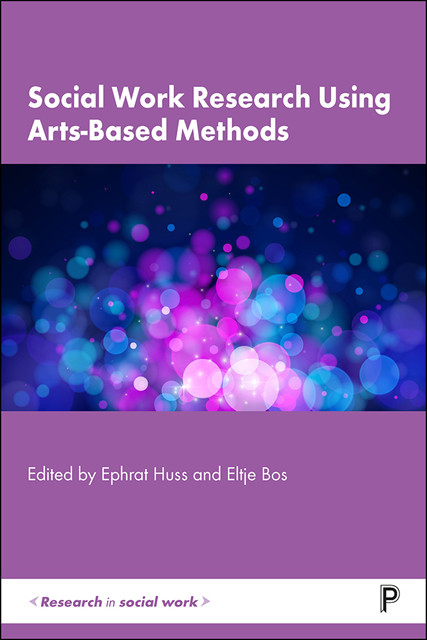Book contents
- Frontmatter
- Dedication
- Contents
- List of figures and tables
- Notes on contributors
- Introduction
- Section I Arts-based research as a method to understand and give voice to marginalised groups
- Section II Using arts-based research to listen to, and give voice to, children in social work
- Section III Arts-based research as a way for researchers and community members to understand communities
- Epilogue
- Index
6 - Mixed arts-based methods as a platform for expressing lived experience
Published online by Cambridge University Press: 13 October 2022
- Frontmatter
- Dedication
- Contents
- List of figures and tables
- Notes on contributors
- Introduction
- Section I Arts-based research as a method to understand and give voice to marginalised groups
- Section II Using arts-based research to listen to, and give voice to, children in social work
- Section III Arts-based research as a way for researchers and community members to understand communities
- Epilogue
- Index
Summary
‘A joint fate’ was the topic chosen by the co-researchers, young adults with disabilities, as one of the topics of the research that they wanted to study in-depth. In the preparatory meeting concerning collection of data on the topic they discussed that many songs, some of which are protest songs, were written by people who shared a joint fate and the desire to change their situation in society, like Bob Marley. Therefore, they decided that this would be the topic they would study by writing poems.
In the research meeting, they invited the co-researchers to work in groups and to find people among them who shared a fate and to express this in a song/poem that they would present. The data that were collected included the poems, the discussion about them, and the ways in which people participated in the discourse.
We used poems, stories, plays, photographs, cards, and other methods in the participatory action research (PAR) that we undertook together with young adults with disabilities. The study explored their lives in preparatory programmes for independent living which were run by the NGO, Gvanim. In our research, we explored together the meaning participation in Gvanim's programmes had for the young adults. By employing different artistic instruments, we had a varied platform, which allowed the young adults to connect and to express their meaningful knowledge – their knowledge from experience, expressed through arts. Turning life experiences into expert and meaningful knowledge from which theoretical insights could be formulated and actions that can have social impacts designed, was made possible via art. The art served as the foundation for the psychological– mental– morale activity, through which expansion of creativity that renews knowledge creates channels for the expression of the knowledge and forges social ties, which make exchange of knowledge possible.
The research design
This study was a PAR study in which the researchers work together with the co-researchers in a repeated cooperative and spiraled process of collection of knowledge, analysis, and action (Arieli et al., 2009). The study was designed to deepen ‘knowledge from experience’, which is created from personal experiences of the group members. The research participants were young adults coping with different disabilities (psychological crises, autism, or physical and sensory disabilities), who were integrated into programmes run by the NGO, Gvanim, and were living together in the community.
- Type
- Chapter
- Information
- Social Work Research Using Arts-Based Methods , pp. 68 - 76Publisher: Bristol University PressPrint publication year: 2022

